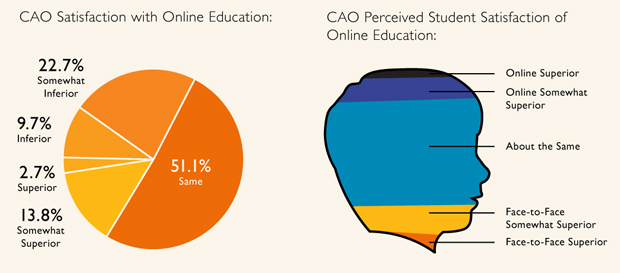Disciplining yourself to sit in front of a computer to complete online classwork is hard. Your mind is on Facebook, Twitter or other things but you have to dedicate your time to finishing the classwork. Also you miss out on the classroom experience. I tend to learn better in a classroom where I can do hands on and talk to people rather than sit in front of a computer.
 Thamara Jean Thamara JeanMiramar, FL
Broward College It's fairly difficult to develop social bonds or career networking when you never meet other students. The only students I've gotten to know (online) aren't near me, so while I'm sure they'll have good advice in the future, it would be better if I knew some local people in my program.
Erin TidwellRedmond, WA
WGU Washington
Student Online courses need to be designed for online delivery, with attention to activities and assignments that promote interaction among the students. When this is not done well, the courses can lack interactivity and a sense of community. When it is done well, online courses can actually be more interactive and rewarding than seat-based classes.
 Terri Straut Terri StrautLittleton, CO
University of Colorado
Director of CU Online |
 Even though online courses aren't face to face I feel I actually had more contact with the professors because there is more opportunity to email for clarification and instuctors often sent email updates. The comfort level in contacting the instructor was much higher than in "real" classrooms. I felt there was more interpersonal dialog. Personal motivation is important though. Although I completed all of my work and recieved high marks, I found it difficult to make myself complete my work unless there were imposed deadlines. Many students do not have the kind of self discipline that it takes to complete online courses. Definitely not for everyone.
Diana AngeloPerryville, AR
University of Illinois - Macomb
Graduate Sometimes it can be difficult when the people who are grading your assignments seem like complete strangers somewhere far away (essentially, since I live in Kansas, that is exactly what they are). It takes a good amount of communication between your advisers and the teachers in charge of the class and also using the resources that are given to you effectively.
 Jennifer Barnes Jennifer BarnesWichita, KS
Western Governors University
Student |
We haven't been good about training our students to be good online students. They frequently take online courses with the mistaken assumption that they are easier than [face to face], not realizing that if you don't stick with it, read the syllabus, know the schedule, and accept responsibility for your progress, you are likely to do poorly.
Kathleen TorrensProvidence, RI
University of Rhode Island
Instructor As an online adjunct instructor, the thing that seems most difficult for some students is time management and self-discipline. I see a very low retention rate, as many people sign up for class thinking it will be easy. When they realize the difficulty of working diligently on your own, many students simply drop out or leave the class without dropping. Even if I email, encourage, and work to connect with them, many times they just can't cut the discipline of working on their own and the lack of accountability that would come with meeting in a classroom two or three times a week.
 Sarah Moore Sarah MooreRoe, AR
University of Arkansas at Little Rock
Instructor I feel somewhat disconnected which can sap my motivation to do schoolwork. It takes real willpower to stay on task some days. It is also hard get my family to not intrude during study time.
Samantha BekkumFranklin, MA
Western Governors University
Student |




 Two weeks after I attended my graduation ceremony, I applied for and accepted a promotion at my job specifically related to my degree. This college worked for me and I am so proud of all I have been able to accomplish.
Two weeks after I attended my graduation ceremony, I applied for and accepted a promotion at my job specifically related to my degree. This college worked for me and I am so proud of all I have been able to accomplish. You can actually get to know classmates better, because of interactive discussion… [Online education] has provided me with the opportunity to obtain a Bachelor's Degree. Only five years ago - it would not have been possible for me, as our area did not have reliable fast internet.
You can actually get to know classmates better, because of interactive discussion… [Online education] has provided me with the opportunity to obtain a Bachelor's Degree. Only five years ago - it would not have been possible for me, as our area did not have reliable fast internet. Lee Henrikson
Lee Henrikson Deb Gearhart
Deb Gearhart Thamara Jean
Thamara Jean Terri Straut
Terri Straut Even though online courses aren't face to face I feel I actually had more contact with the professors because there is more opportunity to email for clarification and instuctors often sent email updates. The comfort level in contacting the instructor was much higher than in "real" classrooms. I felt there was more interpersonal dialog. Personal motivation is important though. Although I completed all of my work and recieved high marks, I found it difficult to make myself complete my work unless there were imposed deadlines. Many students do not have the kind of self discipline that it takes to complete online courses. Definitely not for everyone.
Even though online courses aren't face to face I feel I actually had more contact with the professors because there is more opportunity to email for clarification and instuctors often sent email updates. The comfort level in contacting the instructor was much higher than in "real" classrooms. I felt there was more interpersonal dialog. Personal motivation is important though. Although I completed all of my work and recieved high marks, I found it difficult to make myself complete my work unless there were imposed deadlines. Many students do not have the kind of self discipline that it takes to complete online courses. Definitely not for everyone. Jennifer Barnes
Jennifer Barnes Sarah Moore
Sarah Moore
